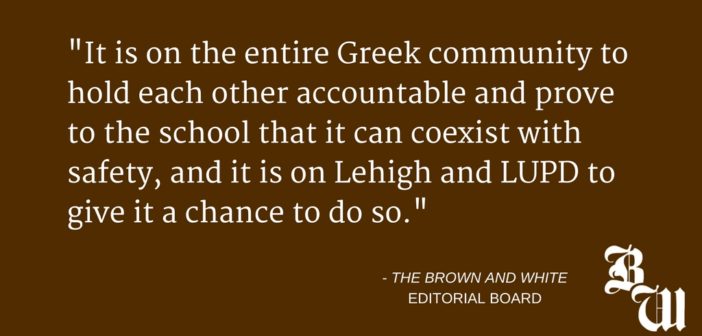What happens when an unstoppable force meets an immovable object?
Does the force overpower the object? Or the does the object stop the force in its tracks?
The answer is neither, because there is no such thing as a force that cannot be stopped or an object that cannot be moved. Everything is relative, so one of the two must win the battle.
Enter IFC.
The Interfraternity Council, which is composed of Lehigh’s 17 social fraternities, has long been the cowboy of social life on campus. From parties on East Fifth Street to tailgates, fraternities provide one outlet to shed the burden of responsibility and often disregard the rules in the name of fun.
The Greek system has a complex relationship with the university because though it pushes boundaries at times, it comes with merits, including philanthropic efforts and strong alumni support. However, when the line is crossed, it is time for the sheriff to step in.
Enter LUPD.
Lehigh University’s police department is used to laying low on campus, keeping watch over the students and intervening only when necessary. It is no secret the No. 4 party school has a lot to police, making it a delicate job for LUPD to facilitate safety while remaining reasonable.
However, with the university recently made aware of hazing in several Greek chapters and a case of hospitalization for alcohol poisoning, LUPD has no longer been laying low.
A noticeable crackdown on hazing in fraternities has been underway in the past couple of weeks.
On Feb. 17, the entire force was out, leaving an empty lot at the police station and two chapter houses were swiped into by LUPD officers. New members were questioned and in some cases, breathalyzed.
It is up for debate whether these measures were an appropriate response, but it is clear LUPD went all out in its efforts to prevent hazing.
The escalated activity was not unwarned — an email went out to every fraternity member at Lehigh the day before emphasizing the zero-tolerance hazing policy. However, the chapters that comprise IFC were not ready for the blitz of police presence that occurred.
The next contact to students did not come until five days after the last email when Provost Pat Farrell updated the Lehigh community by recognizing the investigations into Greek chapters. However, he denied rumors that houses were being “raided” and that students were being “lined up and forced to submit to breathalyzer tests.”
The lack of transparency from Lehigh to the Greek community and student body as a whole, created a swirl of rumors that put the campus into a frenzy. While the nature of the pending investigations should not require all information to be shared, the blaring lights on the Hill in conjunction with the absence of updates on the Lehigh Greeks blog was startling to the community.
However, any disputed imperfections of the investigations do not give the Greek community the right to dismiss the basis for them. No chapter should be placing its new members in danger to the point of hospitalization for the sake of any form of a “pledging” process.
Additionally, there is heightened alert for student safety in Greek life after a recent death at Penn State University. Farrell’s email to students might have come across as defensive, but reading between the lines he asserts that the well-being of Lehigh students is the administration’s top priority.
And even if LUPD is overreacting in its efforts, at worst it is excessively looking to enforce the law. To act like participation in Greek life is a right, and not a privilege, is an arrogant approach to an issue that involves the health of fellow Lehigh students.
It’s sometimes easy to forget the leniency Lehigh affords to its students, and at times like this it is tempting to criticize. However, the only way for fraternities to move forward is to cut the university some slack and accommodate its concerns.
After all, Lehigh is not the only school to begin a battle with Greek life. Other schools have responded with far stricter policies — Penn State suspended all social events for fraternities and sororities for the rest of the semester, and Tufts University did the same in the fall.
It’s clear that some forms of hazing that traditionally might have been socially acceptable are being phased out, and Lehigh fraternities must adapt. There are many other more productive ways to conduct a new member education process besides providing enough alcohol to endanger someone’s life.
It is not enough for some chapters to get behind this idea. The hard work of the entire Greek system to function safely and productively can be undermined by any of its members. If the recent measures taken against Greek life have taught us anything, it is that one poor decision can mean the collapse of an entire community.
It is on the entire Greek community to hold each other accountable and prove to the school that it can coexist with safety, and it is on Lehigh and LUPD to give it a chance to do so. Without cooperation from both sides, things could get worse.
Right now, the unstoppable force of LUPD is on a collision course with Lehigh’s Greek system as we know it. But it can be avoided.
Let’s see where the dust settles.






Comment policy
Comments posted to The Brown and White website are reviewed by a moderator before being approved. Incendiary speech or harassing language, including comments targeted at individuals, may be deemed unacceptable and not published. Spam and other soliciting will also be declined.
The Brown and White also reserves the right to not publish entirely anonymous comments.
6 Comments
Great article. Very well written!
What I dislike seeing in the B&W (and many college newspapers) is the singling out of Greek life, when there is a significantly large presence of parties sponsored by club and varsity sports teams, as well as other social clubs and organizations. It’s true Greeks are a major voice of the social seen, but it does seem like these other groups get away with just as much without people crying fowl.
When Lehigh bought up the properties on the hill, the fraternities relinquished control of their destiny to the university. The fact that the police can just swipe into a fraternity house with little more than a reasonable suspicion is deeply disturbing. I’m surprised there hasn’t been wider talks of chapters moving off campus where warrants are needed before police can enter a premises. If Lehigh continues it’s aggressive targeting of the greek community started under Alice Gast’s reign, then it will quickly become apparent that the ultimate survival of the greek system will depend on gaining autonomy from the university.
It is well known most of the Frats on the Hill are responsible for criminal levels of hazing. Students describe what has happened to them as torture. In the state of Pennsylvania hazing is litigious and has been successfully prosecuted with criminal penalties for the school and individuals who haze. The school has put the Frats on notice they are finally protecting their students, the pledges. This level of respect shown toward the Frats by the school is more respect that what the Frats who haze have shown their own “brothers”.
Stop hazing then there’s no need to claim feigned privacy violations or whine about your sacred survival.
I’d love to see your sources, as you have cited that most frats commit hazing on a highly criminal level and students say it is torture. If that’s your only argument then please do share.
I’d like to point out that the only example this article uses to justify the police swiping into houses is alcohol poisoning. Alcohol poisoning happens to way more people than just “frat guys.” It happens to regular college men and women just the same who are not not Greek associated and who are not being forced to drink. In addition, most fraternities at Lehigh actually are aware of the danger of subjecting their pledges to copious amounts of alcohol because it is regarded as extremely risky regardless if kids go to the hospital or not. They honestly prefer their pledges to not drink too much because it only causes problems for them. They don’t force it and it’s usually up to the new members on how much they want to indulge. I also want to point out that ther organizations who don’t participate in Greek life host parties of their own and are just as risky as fraternities. I’d also like to say that everyone cites the penn state boys death as a reason to fight hazing when the kid died from a fall. He may have consumed a lot of alcohol (imo probably by his own free will) but he died from a physical accident. It’s absurd to completely crack down on all alcohol for frats when that wasn’t even the problem, and if it is, the police should crack down on non Greek life alcohol use too because other people drink just as much as they do.